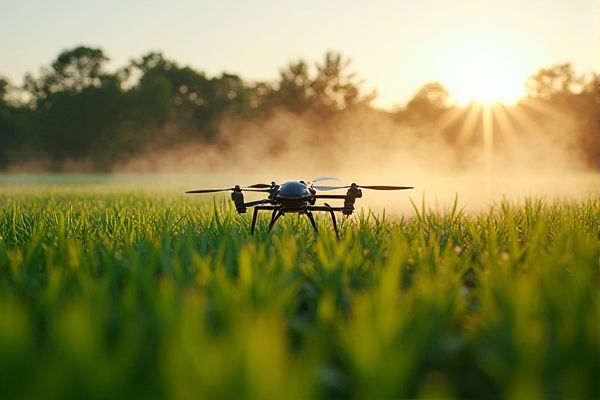
AI technologies significantly enhance pesticide management by enabling precise application methods, which minimize waste and reduce environmental impact. Machine learning algorithms analyze vast datasets, predicting pest outbreaks and determining the optimal timing for pesticide application. Real-time data from drones and sensors facilitate targeted spraying, ensuring that only affected areas receive treatment. Data analytics also support integrated pest management strategies by improving decision-making processes around pesticide use, thus promoting sustainable agricultural practices.
AI usage in pesticide management
Predictive Analytics
AI applications in pesticide management can enhance decision-making by predicting pest outbreaks and optimizing pesticide application. Predictive analytics allows farmers to analyze historical data, weather conditions, and crop health, enabling them to apply pesticides more effectively. For instance, institutions like the International Rice Research Institute use AI to forecast pest invasions, potentially reducing unnecessary pesticide use. This approach not only conserves resources but also minimizes environmental impact and promotes sustainable agriculture.
Pest Identification
AI can enhance pesticide management through improved pest identification accuracy and efficiency. Using machine learning algorithms, such as those developed by institutions like the University of California, farmers can quickly identify pest species and their populations. Accurate identification enables targeted pesticide applications, which can reduce chemical use and minimize environmental impact. This approach also increases the chances of crop yield by ensuring timely and effective pest control interventions.
Crop Health Monitoring
AI can enhance pesticide management by analyzing data from sensors and satellite imagery to determine optimal application times and quantities. Crop health monitoring systems can leverage AI to identify stress indicators in plants, providing farmers with actionable insights. For instance, institutions like the International Rice Research Institute use AI to improve rice crop resilience. These technologies can lead to more efficient resource use and potentially higher yields.
Automated Spraying Systems
AI usage in pesticide management can optimize the application process, reducing waste and environmental impact. Automated spraying systems integrate AI algorithms to determine the precise amount and timing of pesticide application. This technology allows for targeted interventions, potentially minimizing crop damage and improving yield. Institutions like agricultural research centers are exploring these innovations to enhance sustainable farming practices.
Resistance Management
AI applications in pesticide management can enhance the efficiency of monitoring pest populations and predicting outbreaks. By using machine learning algorithms, farmers can optimize their pesticide use, potentially reducing costs and environmental impact. Resistance management strategies can benefit from predictive modeling, enabling targeted interventions to prevent resistance development in pests. For example, institutions like the International Rice Research Institute are exploring AI tools to improve crop protection practices.
Environmental Impact Reduction
AI applications in pesticide management can significantly enhance decision-making by analyzing data on pest populations and environmental conditions. For example, institutions like the University of California are exploring AI models to optimize pesticide application, potentially reducing chemical usage. This technology may lead to lower environmental impact and promote sustainable farming practices. The chance of increasing crop yields while minimizing harm to ecosystems presents a compelling advantage for farmers.
Yield Optimization
AI can analyze large datasets to predict pest outbreaks, enabling timely interventions that may reduce pesticide use. By optimizing application rates and timing, yield optimization can be achieved with greater precision. Institutions like the USDA are exploring AI solutions that could enhance overall crop health and sustainability. This technology presents opportunities for farmers to minimize costs and maximize crop output while fostering environmental stewardship.
Real-time Decision Support
AI can significantly enhance pesticide management by providing real-time decision support through data analysis. For instance, an agricultural institution might implement AI tools to monitor crop health and pest populations, allowing for timely interventions. This predictive capability could reduce pesticide use while maintaining crop yields, presenting a clear advantage for sustainable farming practices. By leveraging AI, farmers can optimize their resources and improve overall efficiency in pest management.
Data-driven Pest Control Strategies
AI can enhance pesticide management by analyzing large datasets to identify pest patterns and optimal treatment timings. Farmers using these data-driven pest control strategies may reduce chemical inputs and lower costs while maintaining crop yields. For example, institutions like the University of California have implemented AI-driven models to predict pest outbreaks. This technology offers the potential for more sustainable agricultural practices and improved environmental outcomes.
Integrated Pest Management
AI can enhance Integrated Pest Management (IPM) by analyzing data from various sources to predict pest outbreaks. For example, incorporating AI algorithms in agricultural practices can help farmers optimize pesticide use based on real-time environmental conditions and pest movements. This may lead to reduced chemical usage and less environmental impact, ultimately benefiting both crop yield and ecosystem health. The potential for cost savings and improved efficiency makes AI an advantageous tool in modern pest management strategies.
 techknowy.com
techknowy.com